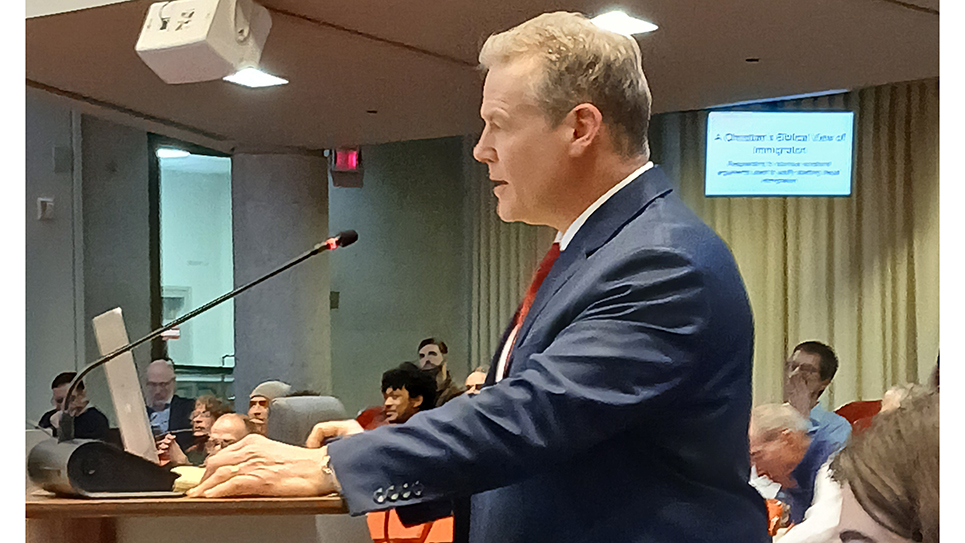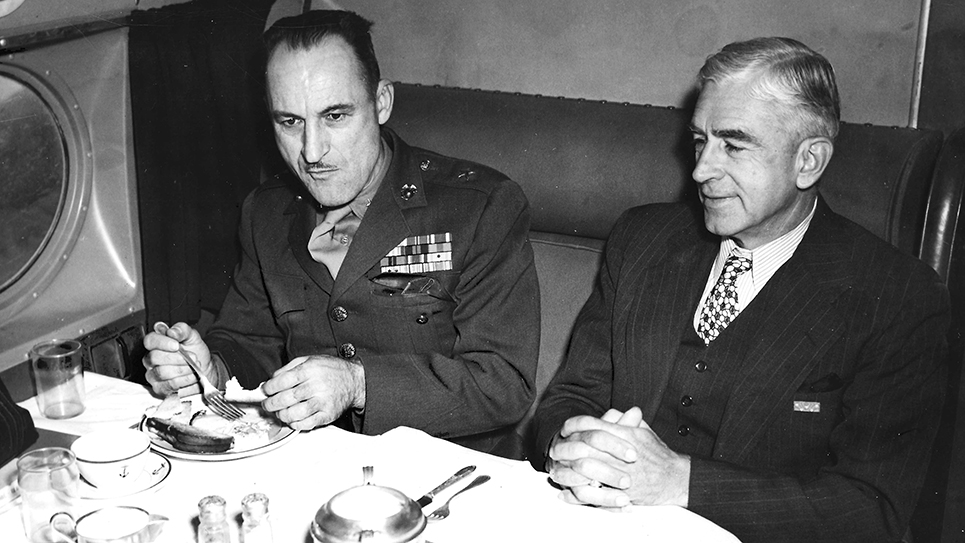By Ray Hill
Brazilla Carroll Reece had served for ten years in the U. S. House of Representatives before being upset in the 1930 general election by Oscar Byrd Lovette of Greeneville, Tennessee. Reece never stopped campaigning to return for Congress and he and O. B. Lovette fought two bitter contests in the 1932 election. Lovette had won the 1930 election by running as an Independent and won a stunning victory after a ten-day campaign. Lovette had run on Reece’s opposition to public ownership of water power projects like Muscle Shoals, which was the forerunner of the Tennessee Valley Authority. Reece and Lovette faced one another again in the 1932 Republican primary, which the former congressman narrowly won. Lovette, crying fraud, once again bolted the Republican Party to run as an Independent in the 1932 general election. It was a three-cornered race between Reece, the Republican nominee, Albert Carter Tipton, a young lawyer running as the Democratic nominee, and Congressman O. B. Lovette running as an Independent. Tipton won just over 7,000 votes, a poor third; Reece won with better than 30,000 votes, while O. B. Lovette was close behind with almost 28,000 citizens having voted for him.
Once again, O. B. Lovette claimed he was the victim of voter fraud and a House subcommittee briefly investigated and found some questionable practices in some counties inside the First Congressional District. The House was controlled by Democrats and B. Carroll Reece was seated. Reece would remain in Congress for the next fourteen years.
Reece, a decorated veteran of the First World War, joined with five other Tennessee congressmen in opposing an economy measure proposed by the Roosevelt administration. Carroll Reece, along with four Democrats and fellow Republican J. Will Taylor, objected to the bill on the basis it harmed veterans. It was a popular position inside Reece’s First District.
Reece had lost the ten years of seniority he had accrued during his time in Congress with his defeat in the 1930 election. Carroll Reece returned to Congress in 1933 as a freshman legislator. Reece’s previous service in the House likely aided him in winning a seat on the House Interstate and Foreign Commerce Committee, which was considered a better assignment than most freshman members received. Reece had served on the committee before when he had been in Congress. The newspapers in Tennessee described Reece’s place on the Interstate and Foreign Commerce Committee as a “much coveted place in the House.” The Greeneville Sun in writing about Congressman Reece’s committee assignment, stated, “The Interstate and Foreign Commerce committee is expected to play a vital part in the effort of the government to bring the nation out of the depression.” The Sun noted the Interstate and Foreign Commerce Committee “will conduct hearings on matters pertaining to legislation with reference to the railroads, bus lines, shipping lines, barge companies and aviation.” The committee also had jurisdiction over power companies and radio networks.
Carroll Reece’s change in attitude about governmental operation of water power was demonstrated when the Chattanooga News published the replies of Tennessee congressmen asked about President Franklin Roosevelt’s plan for development of “the Tennessee river basin.” Reece wrote, “Since my election to Congress, I have been intensely interested in its (the Tennessee River) development.” Reece acknowledged his previous attitude, writing, “When I was in Congress before, I followed the course which I believed held the greatest hope for development of the valley, and the only course which held any hope for adoption at that time.” Congressman Reece then stated his opinion had changed. “Since then the situation has changed,” Reece wrote. “I plan to co-operate with whatever program may best hold these possibilities at this time.” Carroll Reece also stressed time was of the essence for Tennessee and Tennesseans. “I am extremely anxious to get the program under way. It is very important we get something under way at this time.” Congressman Reece added, “It will be of great value to our valley.”
The lingering challenge to his election continued to nip at the heels of Congressman Carroll Reece. From his Greeneville home, former congressman O. B. Lovette said he “had served notice” on Congressman Reece he had filed additional charges in the contested election. The initial charges were the undue influence of excessive money having been spent to win the election by Reece, as well election fraud involving poll taxes and that “non-residents were herded to the polls.” In his latest complaint, Lovette tried to tie Reece’s brother, Joseph I. Reece, to the congressman. Joe Reece had been appointed Tennessee’s state Insurance Commissioner by then-governor Henry Horton. Horton had been disgraced by the massive loss of state funds which Tennessee had deposited with Rogers Caldwell, the business partner of Colonel Luke Lea, Horton’s political mentor and adviser. Governor Horton only barely avoided impeachment and served out the remainder of his term a broken and reviled man. Joe Reece had been involved in his own scandal revolving around lost funds. Former congressman O. B. Lovette was accusing Joe Reece of having been a “large contributor” to his brother’s congressional campaign, along with another brother, Lemuel.
Joe Reece had been indicted for embezzlement, while Lem had been accused of receiving stolen funds. Lovette wrote an open letter to Congressman Carroll Reece stating, “I charge that a part of the proceeds of said bonds were used by J. I. Reece and Lem L. Reece for your benefit and with your knowledge, to pay obligations incurred in your behalf and for money borrowed and used in said election corruptly and unlawfully to influence the voters.” Lovette’s letter supposedly contained a copy of a note for $25,000, a very large sum for the time, by Carroll Reece to Joe Reece. The former congressman claimed it was one of several notes which were used to pay off “a large part of the large corruption fund collected by you.”
An angry Carroll Reece sent a telegram from Washington saying, “There is no basis whatever for Mr. Lovette’s accusations.” “The effort of Mr. Lovette to use the unfortunate situation at Nashville relating to my brothers to reflect upon me, does not do him any credit. I have confidence that such an effort on his part will be resented by all who know me.”
Carroll Reece did his best to ignore the irritation caused by O. B. Lovette and focused on doing his best for his constituents. Congressman Reece objected to the methods being used by the Department of the Interior in selecting from unemployment lists to employ men for local projects. Reece pointed out there were comparatively few unemployment offices in the cities of his district and the lists of unemployed in those district were almost certainly comprised entirely of residents of that particular city. Reece was concerned there were many more unemployed folks outside those cities. Congressman Reece was troubled a great many unemployed folks, equally eager for meaningful employment and jobs, would otherwise be overlooked by the program announced by the Interior Department. “I venture to say that in my hometown of Johnson City, a town of 25,000, that less than a dozen are enrolled for work in the department of labor employment offices because no office is located there, or accessible to the men who would ordinarily enroll,” Reece wrote.
Another indication of Carroll Reece’s understanding of his 1930 defeat was his enthusiastic vote in favor of the Cove Creek Dam. Reece certainly didn’t hesitate to oppose the Roosevelt administration and the Democratic leadership in the House of Representatives; the congressman was one of 86 who opposed the amendment to the farm bill relating to inflation, while those Democrats in the House who were inflationists trounced the Republicans who were opposed to it. Most of those Democrats supporting the amendment were for the government printing more money.
As the session of Congress began to wind down, Congressman Carroll Reece announced he intended to tour the First District. Reece was heading to Jefferson City where he would join Senator Kenneth McKellar in speaking to the Rural letter Carriers’ Association. Reece indicated he intended to visit “every section” of his district as he wanted to absorb “first-hand knowledge” of conditions inside his district, which would help him craft and support legislation to help his people. Reece said he would likely remain in Washington for two weeks following the adjournment of Congress before returning home.
Once back home in Tennessee, Carroll Reece was true to his word and moved around the First District keeping speaking engagements from upper East Tennessee down to the counties around Knox. As Congressman Reece moved around his district to better understand how the people in the First District were faring, he was also renewing friendships with his friends and supporters and making new friends along the way. It also gave Reece the opportunity to hear from people and help folks. Carroll Reece was once again consolidating his hold on the First Congressional District as he anticipated the election of 1934.
Carroll Reece was not yet the political institution he would one day become, nor was he universally loved. His opponents were numerous and they, too, were anticipating the 1934 election. An article published on August 13, 1933 in the Knoxville Journal, a newspaper considered friendly to Reece, speculated upon precisely who would run against the congressman in 1934. According to the political talk in the first District, the Journal reported it was “almost certain” former congressman Oscar Byrd Lovette would run again. Lovette and Reece had run against one another four times; Reece had won three of those contests, while Lovette had won the 1930 general election. A new name was making the political rounds; J. R. Gardner, a Johnson City attorney, was said to be thinking of running. The name of Sam Price, who had run against Carroll Reece in the 1930 GOP primary, was mentioned by some. Opponents of Carroll Reece also evidently tried to convince Everett Greer, governor of the Soldier’s Home in Johnson City, to leave his post to run against the congressman. Greer had long been an ardent supporter of Carroll Reece, a native of Newport, Tennessee and had been U. S. Attorney before becoming governor of the Soldier’s Home.
Congressman Carroll Reece was the principal speaker at the American Legion convention which opened in Bristol, Tennessee in August of 1933. Reece also participated in a colorful parade to celebrate veterans in Bristol. Carroll Reece was also one of four Tennessee congressmen attending the Legion meeting in Knoxville, along with Ridley Mitchell, Gordon Browning, and Jere Cooper. Evidently, Reece’s recent address to his fellow veterans was successful as the Bristol Herald Courier said the congressman “gave the government’s policy unshirted hell…Who would not weep for Spartacus?”
That fall Carroll Reece, along with his wife Louise and their daughter, who was named for her mother, took time for a brief vacation. The congressman and his family took a boat trip on the Great Lakes before going to Chicago where they visited the Century of Progress. They also stopped at the Raleigh Hotel in Washington, D. C. for a few days. Reece had also joined with Tennessee senators Kenneth McKellar and Nathan Bachman lobbying Secretary of the Interior Harold Ickes for the construction of the Scenic Highway which would connect the Smoky Mountain Nation and Shenandoah National Parks. President Roosevelt approved the construction, which was announced in November of 1933.
Reece had to endure the trial of his brother Joe for embezzlement during the early months of 1934 as rumors about candidates for Congress in the First District continued to circulate. Reece did receive some good news in late February 1934 when the House Elections Committee announced the congressman had won the contest filed by O. B. Lovett following the 1932 election.
Carroll Reece was too experienced in politics to believe he would not face serious opposition in the 1934 GOP primary. The question was, who would be the candidate to run against him?






